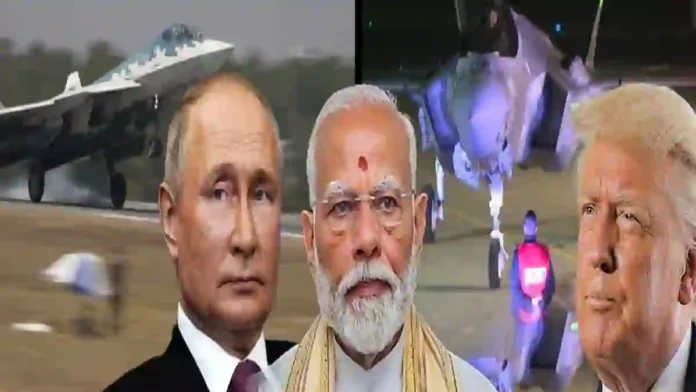In August 2025, India decided to reject the United States’ offer to purchase Lockheed Martin’s F-35 stealth fighter jets, a deal personally proposed by former US President Donald Trump during Prime Minister Narendra Modi’s February visit to Washington. This rejection comes amid escalating trade tensions between the US and India, particularly following Trump’s imposition of a 25% tariff on Indian goods effective August 1, 2025.
India has indicated that acquiring the F-35 is incompatible with its defence priorities, emphasising strategic autonomy, technology transfer, and local manufacturing in line with the “Make in India” initiative, which the US offer failed to adequately address.
Read- How Feasible Would South Korea’s KF-21 ‘Boramae’ Be For The Indian Air Force?
Additionally, the advanced systems of the F-35 are considered incompatible with India’s existing Russian-origin military equipment, such as Il-78 refuelling aircraft and the Integrated Air Command & Control System (IACCS).
In contrast, Russia has presented an attractive alternative by offering its Su-57E fifth-generation stealth fighter jet as a part of a comprehensive package that aligns with India’s defence and industrial goals.
The Russian offer includes full technology transfer and plans for domestic assembly at Hindustan Aeronautics Limited’s (HAL) Nashik facility, which has existing expertise in manufacturing Su-30MKI fighters.
The Su-57E package promises up to 60% localisation and integration of Indian systems, including Astra air-to-air missiles, Rudram anti-radiation missiles, and Virupaksha AESA radar. Initial deliveries of 20 to 30 Su-57E jets could begin within three to four years, with long-term procurement scaling up to 70 to 100 units by the early 2030s.
Alongside, Russia’s Su-35M multi-role aircraft is also offered as an interim solution to bolster India’s fleet as it awaits further indigenous aircraft development.
Read- ‘Ties With Russia Time-Tested’: India Brushes Off Trump’s Penalty Threat On Energy Imports
Read- How India Is Building A Complete Indigenous Fighter Ecosystem With TEJAS MK-2 And AMCA
This “golden deal” from Russia is seen as a strategic move leveraging the cooling of India-US defence relations following trade disputes and the US’s unwillingness to accommodate India’s requirements for co-production and technology sharing.
Russia even offered India unprecedented access to the Su-57’s source code, granting India more autonomy to operate and modify the aircraft, unlike the more restricted US foreign military sales framework tied to the F-35 program.
The shift reflects India’s long-standing defence partnership with Russia, and a clear strategic choice to enhance self-reliance and indigenous capability in defence acquisition, rather than purchasing “off-the-shelf” Western platforms that limit operational independence.
India’s move also aligns with its Multi-Role Fighter Aircraft (MRFA) program, prioritising local manufacturing and technology transfer, which is not met by the US F-35 offer. The rejection of the US jet in favour of the Russian stealth fighters helps India better synchronise new capabilities with its existing Russian-origin equipment and ongoing modernisations, such as the Super Sukhoi upgrade for Su-30MKI jets.
This strategic pivot aims to counter regional threats from China and Pakistan, whose air forces operate fifth-generation and advanced fourth-generation aircraft, thereby maintaining India’s competitive edge in the region.
India has firmly declined the US F-35 stealth fighter jet proposal largely due to trade tensions, incompatibility with existing systems, and a lack of local production and technology transfer terms. Russia’s proposal of the Su-57E, offering extensive technology transfer, domestic assembly, and compatibility with Indian systems, now stands as the preferred next-generation fighter choice for India’s air force modernisation under its “Atmanirbhar Bharat” (self-reliant India) initiative.
Based On TOI Report
Agency




